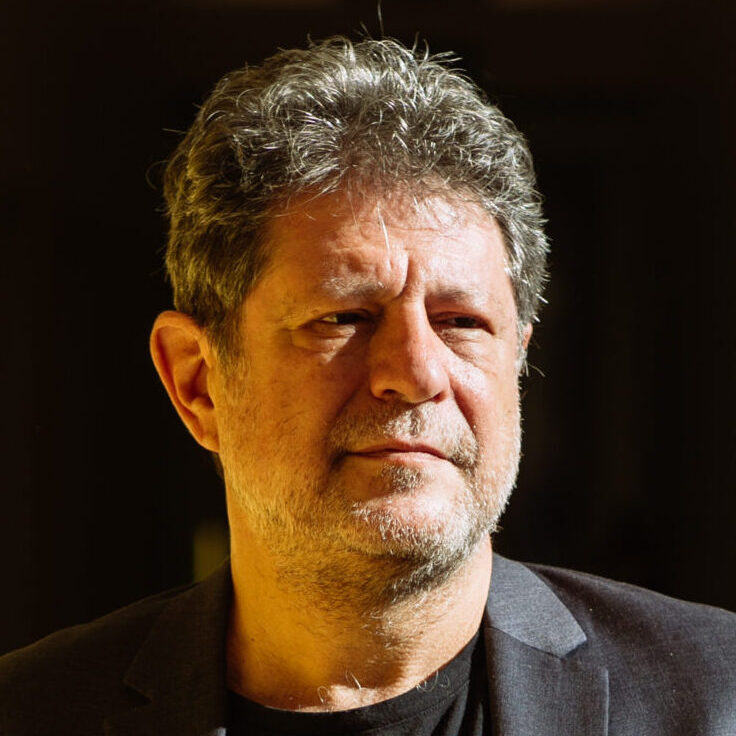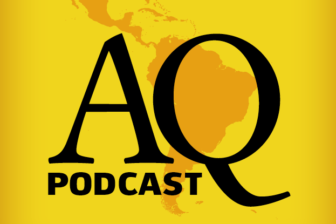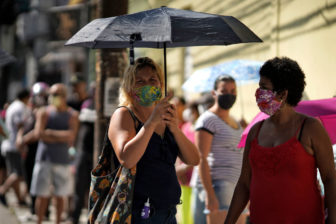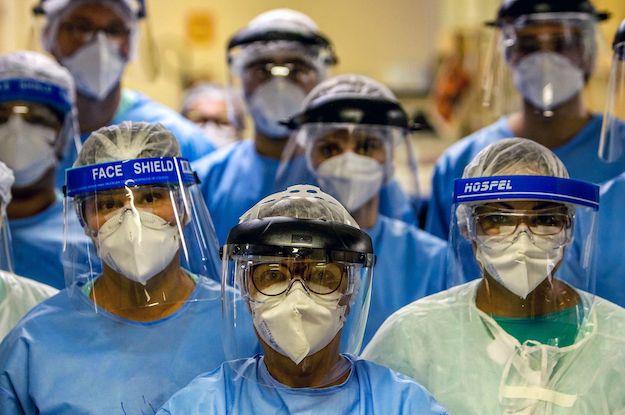“Pandemic backsliding.” That is the label that V-Dem, the world’s leading database on democratic regimes, used to warn about the risks democracies face as the coronavirus spreads.
V-Dem’s assumption is that “emergency provisions, such as the ones in place in many countries during the current COVID-19 crisis, enable states to temporarily limit personal freedoms and checks and balances to react effectively in situations of crisis.” The problem emerges when “some leaders abuse such tools to foster more permanent autocratization by (a) imposing measures that are disproportionate to the severity of crises and (b) keeping emergency provisions in place once the factual situation improves.” Using data on COVID-19 responses by governments in 142 countries in April 2020, the V-Dem Policy Brief shows that 48 countries have a high risk of pandemic backsliding, while 34 are at medium risk.
Some worry about other dire outcomes: As former Brazilian President Fernando Henrique Cardoso recently emphasized, poor people will likely emerge from the pandemic even poorer, deepening actual and perceived inequality, thus making the siren song of populists even more attractive.
These analytical efforts deserve praise, but they are missing something: the possibility that a mishandling of the COVID-19 emergency will foster resistance to power rather than a concentration of it, a resistance that leads citizens to demand more, rather than less, accountability in the medium term. In other words, a pro-democracy backlash. “Pandemic forthsliding,” you could call it.
Interestingly, the forthsliding hypothesis does not discriminate according to ideology or democratic scorecard. Disappointment with the end results of the lockdown/social-distancing strategy would punish those in power regardless of their backsliding score. And, in Latin America, there are many ways in which the end results may disappoint.
Benefit from harm?
Mainstream assessments say there are two kinds of democracies: fragile and robust. Fragile democracies are sensitive to harm, while robust democracies are less so. We draw on the Lebanese-American statistician Nassim Taleb to suggest that a third group is conceivable, one whose members can benefit from harm – as long as the harm is not deadly. To evaluate harm levels, though, we need to diagnose the patient’s health condition.
There are four areas in which Latin America is in a bad position to cope with the COVID-19 emergency: 1) limited recourse to private international capital (the latter tends to flee the region in search for quality, as it has done dramatically in early 2020); 2) rather narrow fiscal space (considerably narrower today than in 2008, as countries are more indebted and running fiscal deficits); 3) a precarious labor force (salaried jobs represent less than half of the active population); and, last but not least, 4) a generalized political disenchantment with liberal democracy.
To be sure, many of these ingredients are present in other regions, but not all four.
Against this background, the length of the crisis and the stringency of the response will be critical to shaping what comes next. The worst combination, for instance, would be a long pandemic disruption with an intense upfront response, as this could exhaust fiscal and psychological fuel in the first half of the marathon – while paving the road for organized social discontent in the second half.
The electoral cycle adds to the uncertainty: If voting takes place early in the crisis, as it did in South Korea, effective administrations will be rewarded; otherwise, they may suffer. Awareness of this effect may lead to early elections or electoral postponements. Under fixed term limits, as established by most Latin American constitutions, postponements under sanitary excuses are carrying the day. In the words of Columbia University’s political scientist María Victoria Murillo, “COVID-19 has weakened two crucial mechanisms for democratic accountability in Latin America – elections and protests – and strengthened presidents who acted decisively and concentrated power to coordinate the response.”
Picture this landscape: an economy recovering slowly, and only partially – the IMF estimates that, globally, activity will converge to a growth path 5% below its pre-COVID trend. Substantial unemployment, both latent (contained by job retention subsidies and employee furlough schedules) and disguised (many unemployed freelancers will be recorded as inactive). Zombie companies hanging on the string of publicly guaranteed, unpayable loans. A deeply dual income distribution, with salaried workers protected by job support and precarious and disenfranchised workers lining up at the welfare window. All this, by the end of 2020.
Now, imagine 2021, and it is easy to conjecture a Weimar Republic landscape breeding national populist types. Perhaps too easy.
However, we could argue that, in contrast with the rally-around-the-flag support for early lockdowns, months of painful concentration of executive power may feed discontent, apprehension, even opposition to the pandemic Big Brother. As the virus threat subsides and emergency fatigue sets in, non-executive institutions – and citizens at large – are likely to overcompensate: enough emergency discipline already, let’s go back to normal.
What does not kill you, makes you stronger. Just like a biological organism, democracy may indeed be strengthened rather than weakened by stressors – provided they are not strong enough to kill it.
Hits and misses
There is a second factor that may push Latin American democracies in a virtuous direction. Let’s call it the success bias. By the beginning of 2021, we may not be out of the woods – immunity still far from the herd threshold – but we’ll have numbers, and some governments will have done better than others.
Some of the most egregious leaders in terms of democratic backsliding are proving to be the most ineffective at managing the pandemic – and ineffective governments tend to lose support. A case in point is Brazil, where, as in the United States, resistance to presidential policies has emerged not only from public opinion, subnational authorities, and congressional leaders, but also from Supreme Court judges and even cabinet members. Recent research has shown a worldwide resort to institutional checks and balances in times of pandemic, countering “simplistic claims of executive concentration.”
Add to that the international pressure: Under global threats, irresponsible leadership is not only harmful for domestic constituencies, but also for neighbors – and, in the case of large countries, for the world at large. Other states may feel threatened by pandemic mismanagement and may launch attempts to either contain the maverick or support its opponents. Or, at the very least, they may leave the country out of the future travel bubbles within which we will continue to be world citizens.
Are we too optimistic?
Pre-existing trends in the region were not democracy-friendly. For starters, Latin America was already at risk of becoming “the land of militarized democracies.” Just as in the United States, democratic supporters in the region placed their bets on the military moderating populist leaders rather than replacing democratic ones. Those bets have suffered a severe blow, but cannot be dismissed just yet. Second, given the pre-pandemic prevalence of street protests, anarchy rather than tyranny appears more likely should incumbents sink public health or the economy. Third, opposition parties were in disarray almost everywhere. Where would an anti-authoritarian resistance find an alternative leadership?
It would be as foolish to deny these hazards as it would be to let them blind us of better viable developments.
If we are right, the future of democracy in post-COVID Latin America lies not only in how governments respond to crises without undermining democratic standards, but also in how non-executive institutions, political parties and civil society adapt and react to months of executive arbitrariness and enforce democratic accountability. At that moment, demand for a less smothering government may revive a vanishing political center and free countries from backsliding into the Orwellian ending that many fear for the region.
Pandemic forthsliding is not inevitable, of course, and it may not even be the most likely outcome; but is it not implausible, either. Democracy is contingent on human, not viral action. Ailing democracies worldwide face a chance not just to resist or fail but to get tougher, and better. May a deadly virus be turned into a democratic vaccine.
—
Levy Yeyati, an economist, is the dean of the School of Government of Universidad Torcuato Di Tella, and a nonresident senior fellow at The Brookings Institution.
Malamud, a political scientist, is a senior research fellow at the Institute of Social Sciences of the University of Lisbon, Portugal.










